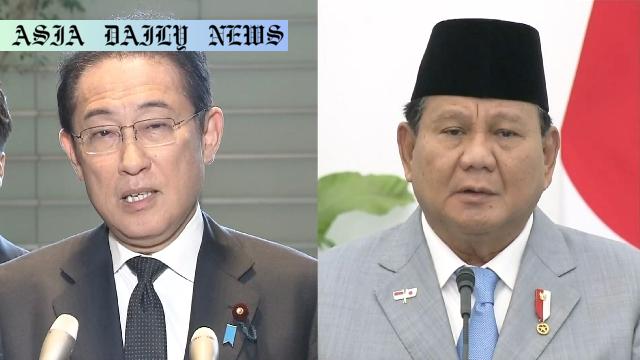Carbon Neutrality: Kishida and Prabowo agree to promote the Asia Zero Emission Community to achieve neutrality and economic growth.

Collaborative Efforts for Carbon Neutrality
In an effort to promote sustainable development in the Asia-Pacific region, former Japanese Prime Minister Kishida Fumio and Indonesian President Prabowo Subianto have reached a consensus to advance the Asia Zero Emission Community (AZEC) initiative. Proposed by Kishida during his tenure, AZEC aims to unite 11 member nations, including Japan, several Southeast Asian countries, and Australia, to achieve both carbon neutrality and economic growth. This historic partnership emphasizes a shared responsibility to confront the climate crisis by fostering innovation and collaboration among participating nations.
The discussions between these leaders reaffirmed the importance of balancing environmental sustainability with economic progress. Collaborative efforts like AZEC signal a growing recognition that achieving long-term growth requires addressing pressing environmental issues such as reducing carbon emissions and transitioning to clean energy. By adopting forward-thinking measures, AZEC hopes to set a global benchmark in sustainable development.
Tackling Global Economic Challenges
During the meeting, Kishida and Prabowo also exchanged views on broader global economic concerns, including the implications of the U.S.-China tariff dispute. Both leaders acknowledged the potential impacts of these economic tensions on global trade systems, reiterating their commitment to maintaining a rules-based, open, and free-trade system. In their view, fostering economic stability is not only a national priority but also a regional necessity.
To this end, the AZEC initiative recognizes the interconnectivity between regions and the global markets. As the two nations discussed strategies for economic collaboration, they emphasized the necessity of fostering trust, transparency, and adherence to international norms. Strengthening multilateral ties anchored in shared principles will serve as a foundation for resilience in the face of global economic challenges.
Shared Vision for Peace and Prosperity
Kishida characterized Indonesia as an indispensable partner with which Japan shares core values and principles. Beyond their efforts for environmental sustainability, the leaders discussed the importance of building a peaceful and prosperous global society. Their discussions reflected a commitment to fostering unity, stability, and progress within the international community.
By aligning their objectives and leveraging initiatives like AZEC, Japan and Indonesia aim to influence global policies on sustainability and economic equity. This partnership is not merely a diplomatic gesture but a firm commitment to shaping the future of regional and global cooperation. Together, these nations exemplify a vision for progress, one that marries environmental responsibility with economic aspirations.
Conclusion
The collaboration between Japan and Indonesia demonstrates a promising approach to resolving contemporary global challenges. Through initiatives such as AZEC, the region is poised to achieve carbon neutrality without compromising economic growth. This partnership highlights the power of shared vision and cooperative action in overcoming challenges, fostering innovation, and building a sustainable future for the region and beyond.
Commentary
Reflecting on the Importance of Regional Collaboration
The recent discussion between Kishida and Prabowo is a clear indication of the growing realization that no single country can tackle the challenge of climate change in isolation. The Asia Zero Emission Community (AZEC) embodies a cooperative spirit aimed at harmonizing environmental and economic priorities, a need that has never been more urgent within the context of today’s climate challenges. Regional alliances like AZEC hold the potential to serve as catalysts for worldwide action.
The emphasis on shared responsibility and collaborative innovation laid out in the agreement between Japan and Indonesia underlines a new paradigm in global policymaking. The leaders’ acknowledgment of the balance required between economic growth and sustainability demonstrates that achieving environmental objectives does not necessitate sacrificing development goals.
Encouraging More Inclusive Partnerships
This dialog between the two nations also hints at the importance of inclusivity in addressing multi-faceted issues such as climate change. AZEC’s structure, which includes 11 nations from diverse socio-economic and developmental conditions, promotes the exchange of ideas, technologies, and practices that may not emerge in more regionally confined frameworks. By fostering such inclusive partnerships, AZEC exemplifies how countries can pool their strengths to achieve shared goals.
The emphasis on trust and transparency in the leaders’ discussions reflects the imperative to address climate justice concerns. Some countries are disproportionately affected by climate-related changes, and this initiative signals a prioritization of equity, ensuring benefits and support are shared across nations.
Paving the Way for Global Advocacy
What’s particularly noteworthy in this development is the potential for AZEC to serve not only as a regional alliance but also as a model for international action. Partnerships such as these could pave the way for countries worldwide to implement frameworks driven by cooperation and mutual benefit, setting the stage for a new era in addressing climate challenges. As sustainability continues to take center stage in global discussions, leadership initiatives such as AZEC can inspire confidence in the ability of nations to find common ground and shared missions in seemingly polarizing times.
The conversation between Kishida and Prabowo, steeped in both pragmatism and vision, showcases a roadmap for a more sustainable and equitable world. This collaboration is a step toward shaping a resilient, inclusive, and forward-thinking global society.


